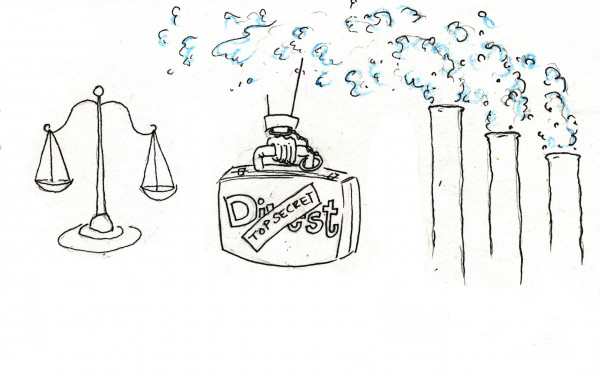Why Divesting From Fossil Fuels at Concordia is Crucial
The divestment movement has one major goal: peel away fossil fuel companies’ veil of social support by pressuring investors to sell their assets.
Since its humble beginnings on a handful of college campuses in 2011, the divestment movement has spread worldwide. Thousands of foundations, universities, and individuals have pledged to divest over $3.4 trillion from the fossil fuel industry.
Despite the momentum, we have yet to see a Canadian university follow through with full divestment, showing a disturbing lack of leadership in our institutions of higher learning.
Canada is one of the top three largest per-capita emitters of greenhouse gases, and our government hands out various forms of subsidies to the industry totaling more than $2.7 billion every year. The political landscape in Canada requires a drastic shift. We need to begin rejecting our tacit acceptance of the tar sands and its so-called “place in our economy.”
This shift needs to come from every sector of our society—and what better place to begin than the academic institutions that brought climate science into mainstream discourse.
Even while Concordia continues to produce research on the cataclysmic effects of climate change, our investments in fossil fuels show a financial interest in the degradation of our global future.
The scientific consensus on anthropogenic climate change should be reflected in every facet of an institution of higher learning. Concordia needs to take true leadership on the global climate crisis by divesting its assets away from this destructive industry.
Just over three years ago, we learned that Concordia invests between $11 to 12 million in the fossil fuels industry—information which led to the formation of Divest Concordia. We were a small group of people interested in using our status as Concordia students to take tangible action on climate change. We set about disseminating this information in the hopes of getting people involved and forcing the university to sell its investments.
In the fall of 2013, we helped set up a Socially Responsible Investment working group with the university. It was a way to establish a dialogue on divestment between students and the administration.
Divestment is a tactic, not a solution—organizing workshops, movie screenings, and art builds are all integral ways to start building awareness about climate change.
Our first year as a group was spent educating the community—as well as ourselves—on the multifaceted issue of climate change, and trying to find ways to apply that knowledge into the way we organized.
By late 2014, we had some traction with the administration. The school decided to experiment in sustainability by setting up a $5 million fund from their endowment that would screen out unsustainable investments—including fossil fuels. While this decision caused a bit of a media splash, it unfortunately coincided with the end of the Socially Responsible Investment working group.
A major part of this second year was spent on restructuring—to refocus on the grassroots mobilizing that formed the basis of our movement, and worked on making our organizing more inclusive to the struggles of marginalized groups—something no serious environmental movement can ever overestimate.
While the Socially Responsible Investment working group ended, the administration has set up the Joint Sustainable Investment Advisory Committee, which includes a permanent seat for Divest Concordia. We finished off our third year organizing around the Energy East pipeline and the Paris Climate Accords. A growing number of associations, professors, student groups, and external organizations associated with Concordia have joined the campaign.
Which brings us to the present. We’re in the midst of a critical time for the global environmental movement. In the next five years, we have to transition into a new economy, one that does not threaten the global ecosystem with GHG emissions. Unless we are well on our way to building this economy in the next half decade, scientists warn, we will be locking in a global temperature increase of 2 degrees or more. The need for a strong environmental movement grows more urgent with every year.
The campaign is about more than just fossil fuel divestment; it’s about changing the way we think about climate change, and finding new ways to integrate the full, intersectional meaning of sustainability into both our institutions and daily lives.
To make that happen, though, we’re going to need to build pressure in our school. That’s something everyone can be a part of—including you.
Marcus Peters is a member of Divest Concordia and the Loyola Coordinator of the Concordia Student Union.



_600_375_90_s_c1.jpg)

